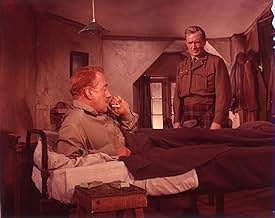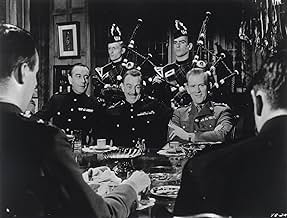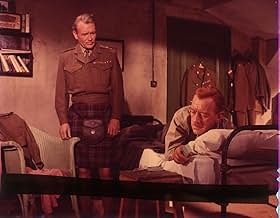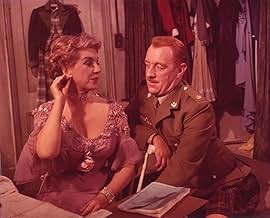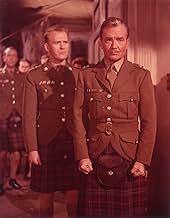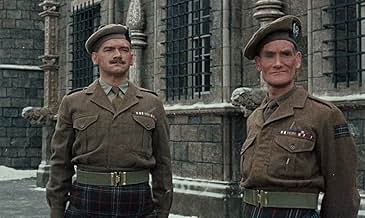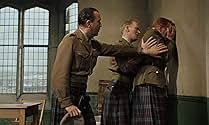IMDb RATING
7.5/10
5K
YOUR RATING
After World War II, a Highland Regiment's acting Commanding Officer, who rose from the ranks, is replaced by a peace-time Oxford-educated Commanding Officer, leading to a dramatic conflict b... Read allAfter World War II, a Highland Regiment's acting Commanding Officer, who rose from the ranks, is replaced by a peace-time Oxford-educated Commanding Officer, leading to a dramatic conflict between the two.After World War II, a Highland Regiment's acting Commanding Officer, who rose from the ranks, is replaced by a peace-time Oxford-educated Commanding Officer, leading to a dramatic conflict between the two.
- Nominated for 1 Oscar
- 2 wins & 7 nominations total
Featured reviews
Alec Guinness is an amazingly under-appreciated actor. While most remembered for his Obi-Wan character, this was one of his least interesting or demanding roles. Few today realize the depth and range of his characterizations as well as the realism that he infused his characters with in his previous films. He was one of the finest British actors and this film is yet another example of his skills.
Guinness plays an angry and blustering Scottish officer who may also be an alcoholic (he at least is a problem drinker and shows many signs of alcoholism). The film begins with this popular officer throwing a farewell party, of sorts, with the men in his command. It seems that Guinness was given temporary command but a replacement (John Mills) is due to arrive shortly--dashing Guinness' hopes for this position becoming permanent.
Because Guinness' character is so very flawed and petty, he does much to try to undermine the new C.O.. In particular, Mills is a "by the book" sort of officer and Guinness ignores changes Mills orders--and by example, derision and a lack of respect for Mills spreads through the ranks. Instead of behaving like officers and gentlemen, the men behave like this is some sort of popularity contest and they show contempt for their new leader. None of this is helped by Guinness' drinking, as it gets him in trouble and creates serious problems for the regiment.
While Mills, as usual, does a great job in the film playing a man who is suffering from Post-traumatic Stress Disorder, the film is definitely Guinness'. His boorish character is a great example of him once again immersing himself into a character and the way he responds to the tragedy near the end of the film gives the character great depth and a bit of sympathy--something you needed to make this a stand-out film.
The bottom line is that this film is extremely well-crafted. The acting is universally excellent, the script tense and well-written and the film is great unless you are the type of person who demands lots of action. While a film about the military, this is no action film. Wonderful.
Guinness plays an angry and blustering Scottish officer who may also be an alcoholic (he at least is a problem drinker and shows many signs of alcoholism). The film begins with this popular officer throwing a farewell party, of sorts, with the men in his command. It seems that Guinness was given temporary command but a replacement (John Mills) is due to arrive shortly--dashing Guinness' hopes for this position becoming permanent.
Because Guinness' character is so very flawed and petty, he does much to try to undermine the new C.O.. In particular, Mills is a "by the book" sort of officer and Guinness ignores changes Mills orders--and by example, derision and a lack of respect for Mills spreads through the ranks. Instead of behaving like officers and gentlemen, the men behave like this is some sort of popularity contest and they show contempt for their new leader. None of this is helped by Guinness' drinking, as it gets him in trouble and creates serious problems for the regiment.
While Mills, as usual, does a great job in the film playing a man who is suffering from Post-traumatic Stress Disorder, the film is definitely Guinness'. His boorish character is a great example of him once again immersing himself into a character and the way he responds to the tragedy near the end of the film gives the character great depth and a bit of sympathy--something you needed to make this a stand-out film.
The bottom line is that this film is extremely well-crafted. The acting is universally excellent, the script tense and well-written and the film is great unless you are the type of person who demands lots of action. While a film about the military, this is no action film. Wonderful.
You will never know whether you should love or hate the two lead male actors this this movie. Just when you find yourself hating the Guiness character, you will be pulled in the opposite direction, and find yourself feeling sad for him. Same for everyone really in this story which is what makes it so engaging. The rich and privileged John Mills is easy to hate as he didn't have to work hard to get where he is. But that very stigma is what hurts him, as he is never really given a chance to be seen as anything more than a privileged fool, so then you pity him. Guiness plays a character who worked very hard for everything he has, and is to be admired until you realize he doesn't give any room for kindness, or compassion, and then you pity him too, but for different reasons. I saw this movie at 3:00 am on a work night, and couldn't move from the screen, despite my early day at work. I was pulled into this story that seemed too familar to me as we are all guilty of either judgement. Brilliant.
British military drama starring Alec Guinness as Maj. Sinclair, the loud, boisterous commanding officer of a Scottish regiment in the years after WWII. Higher ups decide that Sinclair isn't an appropriate peacetime commander, so they send Col. Barrow (John Mills) to replace him. Barrow is a strict ruler-follower who likes life quiet, sober, and "respectable". This sets the stage for a battle of wills between the two officers.
I've heard of this movie for a long time, and knew that it was well-liked (Guinness considered it one of his best performances), but it wasn't what I was expecting. It's a psychological study of these two men, and, with the Barrow character, an early examination of PTSD before it was called that (he was a P. O. W. In a Japanese camp, and was tortured). The accents can be a bit much, and if you don't like bagpipes, this is definitely not the movie for you, but I thought the acting was terrific, and the slow-burn drama builds to a shattering conclusion.
I've heard of this movie for a long time, and knew that it was well-liked (Guinness considered it one of his best performances), but it wasn't what I was expecting. It's a psychological study of these two men, and, with the Barrow character, an early examination of PTSD before it was called that (he was a P. O. W. In a Japanese camp, and was tortured). The accents can be a bit much, and if you don't like bagpipes, this is definitely not the movie for you, but I thought the acting was terrific, and the slow-burn drama builds to a shattering conclusion.
Rough-necked and uneducated Jock Sinclair (Alec Guinness) has fought his way through the ranks, and despite the love of hard drink and the odd highland fling, has proved himself in the very heat of battle. So much so that he has been made Acting Colonel of an (unnamed) Scottish regiment.
Sadly, for him, his informal barracks is going to be reformed under the auspices of the public school via Sandhurst graduate Lt. Col. Basil Barrow (John Mills) who believes in doing all things by-the-book. This sets the scene for a post WW2 power battle under a grey Scottish winter sky.
When writing a review of any excellent film - such as this - you are frightened you are going to put people off by its limits. However this is a classic example of less really being more. The claustrophobic atmosphere and the sense that armies without wars are prone to be heavy with politics. Not unlike like prisons: To many people in the same space with too much time on their hands. They drive men mad and extend the worst in the human character.
Guinness and Mills are fantastic actors. Oscar winners both and more. They could read the phone book and captivate an audience. For the record they had both seen war service, although Mills baby face and short stature had made him the butt of many jokes (many he was happy to re-tell). Did this help form his character? The guy who was laughed at and therefore worked even harder to enforce discipline or gain respect. This is, naturally, speculation.
I have no the knowledge of author (of book and film) but just by watching you know he has seen it for real. The little details that only the insider would know. The story would just as well be served as a theatre piece and it employs some its stock devices. The accidental narrator being the more obvious. Maybe this was to save money, but it would not have helped the picture to see - say - the incident that Mills had to endure from the Japanese.
Eyewitness testimony from the filming says that Guinness thought he would look silly in a kilt and used fake tanner on his pale legs. He is not the biggest of men and has to stick out his chest and stand on tiptoe to be imposing, but you do believe him. What an actor he was. An actor's actor. Like Peter Sellars, totally bland out of character (and not always very nice as he writes in his various autobiographies) but always mesmeric on screen. Mills - on the other hand - could never work as a bad guy. The perfect uncle figure who you would want to confide in.
(I am maybe giving the support cast short-shrift - but most British films of the time had quality character actors. No exception here. Amazing to see Susannah York in her first role.)
Alfred Hitchcock himself said Tunes of Glory was his own personal favourite film. It is not quite mine, but a great demonstration of how brilliant film can be when top class actors get their teeth in to a wonderful script. The end is pure Shakespeare. Don't watch it once, watch it twice...
Sadly, for him, his informal barracks is going to be reformed under the auspices of the public school via Sandhurst graduate Lt. Col. Basil Barrow (John Mills) who believes in doing all things by-the-book. This sets the scene for a post WW2 power battle under a grey Scottish winter sky.
When writing a review of any excellent film - such as this - you are frightened you are going to put people off by its limits. However this is a classic example of less really being more. The claustrophobic atmosphere and the sense that armies without wars are prone to be heavy with politics. Not unlike like prisons: To many people in the same space with too much time on their hands. They drive men mad and extend the worst in the human character.
Guinness and Mills are fantastic actors. Oscar winners both and more. They could read the phone book and captivate an audience. For the record they had both seen war service, although Mills baby face and short stature had made him the butt of many jokes (many he was happy to re-tell). Did this help form his character? The guy who was laughed at and therefore worked even harder to enforce discipline or gain respect. This is, naturally, speculation.
I have no the knowledge of author (of book and film) but just by watching you know he has seen it for real. The little details that only the insider would know. The story would just as well be served as a theatre piece and it employs some its stock devices. The accidental narrator being the more obvious. Maybe this was to save money, but it would not have helped the picture to see - say - the incident that Mills had to endure from the Japanese.
Eyewitness testimony from the filming says that Guinness thought he would look silly in a kilt and used fake tanner on his pale legs. He is not the biggest of men and has to stick out his chest and stand on tiptoe to be imposing, but you do believe him. What an actor he was. An actor's actor. Like Peter Sellars, totally bland out of character (and not always very nice as he writes in his various autobiographies) but always mesmeric on screen. Mills - on the other hand - could never work as a bad guy. The perfect uncle figure who you would want to confide in.
(I am maybe giving the support cast short-shrift - but most British films of the time had quality character actors. No exception here. Amazing to see Susannah York in her first role.)
Alfred Hitchcock himself said Tunes of Glory was his own personal favourite film. It is not quite mine, but a great demonstration of how brilliant film can be when top class actors get their teeth in to a wonderful script. The end is pure Shakespeare. Don't watch it once, watch it twice...
As a very late reviewer I see that very much of what I would have said has already been said so I endorse rather than repeat it. What is surprising is that these lengthy perceptive and very admiring reviews have come not from the film's country of origin but from the USA where it seems to have struck a particular chord. Reviewers have noted Guinness's perhaps finest ever performance as well as, very unusually the fine ensemble playing where script, casting and direction must all have been of similar quality.
I would take issue with the reviewer who said that the Mills character would never have been given command. Clearly he had been highly educated, had a long and distinguished career in a headquarters job following a traumatic time as a POW of the Japanese. He would have at least earned some kind of moral right at the end of his career and in peacetime to be given the job that he believed he really wanted and might have thought to have been among friends. He would most likely have been highly respected owed favours and been able to pull strings. Had Jock Sinclair (Guinness) - unashamedly uneducated, rough and proud to have been educated in Barlinnie jail, Glasgow and deeply popular with his men not been the officer he replaced, most likely Colonel Barrow would have made a success of it. The whole entirely believable tragedy came about through the grotesque mischance that with these so different characters, one had to wrest command - and respect of the men - from the other. Colonel Barrow's fragility was only exposed when he tried to impose his English "civilising" ways on the one person whose whole being rejected them. Bad enough if it had been simply about class, here it was a battle for the Scottish soul. These deeper levels of conflict deriving from earlier historical intra-Scottish battles was suggested by one reviewer. The film tells a story which perhaps could have been set in almost any country with a strong military tradition - France. Germany, Japan etc rather like its near name-sake "Paths of Glory" by Stanley Kubrick set in WW1 France. Here though the central conflict presumably had very deep roots in Scottish ethnic and tribal history of clan wars, of Highlanders vs Lowlanders even of those supposed English-loving "traitors" who "sold" Scotland to "a parcel of rogues" (The English) in 1707. It may well be that for Sinclair, the entirely Anglicised Colonel Barrow (gin-drinking, aloof, distant and without a hint of a Scottish accent) represented exactly that kind of treacherous pseudo-Scot.
One reviewer describes it as "pure John Ford" leaving it unclear if he is suggesting that it was similar or derivative. With art in general, its lower and by definition least original forms ape others. This film does not ape any other - as already said the intensity of the conflict derives not just from class but from old old historical grievances between two intimately close nations. In "Old" Europe grievances and rivalries ran long and deep.
Just a rather sad footnote. One reviewer mentioned similarities to earlier John Ford/John Wayne movies. The entire John Wayne archive is to be seen on a continuously circulating basis on two of Britain's five national television channels State broadcaster the BBC and so-called public service broadcaster Channel 4. Yet in contrast Tunes of Glory has rarely been shown. It reappeared 2 years ago but in a poor quality print on a remote satellite channel which plays mainly public domain material. Many of Britain's fine vigorous quality films of the 1960s have never been shown at all on British television until a few months ago when again a very minor satellite channel started showing them: Otley, The Hireling, The Reckoning and others. I did not see them originally and it was revelation seeing the bold acting and directing talent which existed then and how sad is the current decline into the Lock Stock etc formulaic gangster stuff. Very curious indeed that great British films are not shown on the supposed British public service channels and it is left to small satellite channels Movies4Men and Simply Movies to show them. Very curious indeed. Public service broadcasting not in the service of the public.
I would take issue with the reviewer who said that the Mills character would never have been given command. Clearly he had been highly educated, had a long and distinguished career in a headquarters job following a traumatic time as a POW of the Japanese. He would have at least earned some kind of moral right at the end of his career and in peacetime to be given the job that he believed he really wanted and might have thought to have been among friends. He would most likely have been highly respected owed favours and been able to pull strings. Had Jock Sinclair (Guinness) - unashamedly uneducated, rough and proud to have been educated in Barlinnie jail, Glasgow and deeply popular with his men not been the officer he replaced, most likely Colonel Barrow would have made a success of it. The whole entirely believable tragedy came about through the grotesque mischance that with these so different characters, one had to wrest command - and respect of the men - from the other. Colonel Barrow's fragility was only exposed when he tried to impose his English "civilising" ways on the one person whose whole being rejected them. Bad enough if it had been simply about class, here it was a battle for the Scottish soul. These deeper levels of conflict deriving from earlier historical intra-Scottish battles was suggested by one reviewer. The film tells a story which perhaps could have been set in almost any country with a strong military tradition - France. Germany, Japan etc rather like its near name-sake "Paths of Glory" by Stanley Kubrick set in WW1 France. Here though the central conflict presumably had very deep roots in Scottish ethnic and tribal history of clan wars, of Highlanders vs Lowlanders even of those supposed English-loving "traitors" who "sold" Scotland to "a parcel of rogues" (The English) in 1707. It may well be that for Sinclair, the entirely Anglicised Colonel Barrow (gin-drinking, aloof, distant and without a hint of a Scottish accent) represented exactly that kind of treacherous pseudo-Scot.
One reviewer describes it as "pure John Ford" leaving it unclear if he is suggesting that it was similar or derivative. With art in general, its lower and by definition least original forms ape others. This film does not ape any other - as already said the intensity of the conflict derives not just from class but from old old historical grievances between two intimately close nations. In "Old" Europe grievances and rivalries ran long and deep.
Just a rather sad footnote. One reviewer mentioned similarities to earlier John Ford/John Wayne movies. The entire John Wayne archive is to be seen on a continuously circulating basis on two of Britain's five national television channels State broadcaster the BBC and so-called public service broadcaster Channel 4. Yet in contrast Tunes of Glory has rarely been shown. It reappeared 2 years ago but in a poor quality print on a remote satellite channel which plays mainly public domain material. Many of Britain's fine vigorous quality films of the 1960s have never been shown at all on British television until a few months ago when again a very minor satellite channel started showing them: Otley, The Hireling, The Reckoning and others. I did not see them originally and it was revelation seeing the bold acting and directing talent which existed then and how sad is the current decline into the Lock Stock etc formulaic gangster stuff. Very curious indeed that great British films are not shown on the supposed British public service channels and it is left to small satellite channels Movies4Men and Simply Movies to show them. Very curious indeed. Public service broadcasting not in the service of the public.
Did you know
- TriviaSir Alec Guinness was offered the role of Lieutenant Colonel Barrow, but asked for the role of Major Sinclair instead. He then suggested Sir John Mills for the other role.
- GoofsPipe Major MacLean is never shown with a set of bagpipes. In particular, he is a mere observer at band practice. A pipe major is not only the leader of the band but also its chief instructor, and it is unthinkable that he would not play an active role in all practices.
- Quotes
Major Jock Sinclair, D.S.O., M.M.: We're on a first name basis in this regiment. Your first name is Derek. My first name is Major.
- ConnectionsFeatured in Film Extra: Alec Guiness (1973)
- How long is Tunes of Glory?Powered by Alexa
Details
- Runtime
- 1h 47m(107 min)
- Color
- Aspect ratio
- 1.66 : 1
Contribute to this page
Suggest an edit or add missing content


